Sustainable tourism destination management - Some theoretical issues and management suggestions
Abstract: For the sustainable development of a tourism destination, destination management organizations need to make a plan of developing tourism according to the three
pillars of the sustainable triangle: economy, society, and the environment in order to ensure the harmonious benefits for all stakeholders. Some suggestions for sustainable tourism
management include: raising awareness about sustainable tourism, conserving natural and
cultural values, minimizing impacts of seasonality on tourism, minimizing negative impacts
on the environment from tourism activities, increasing the participation of local communities
in tourism activities
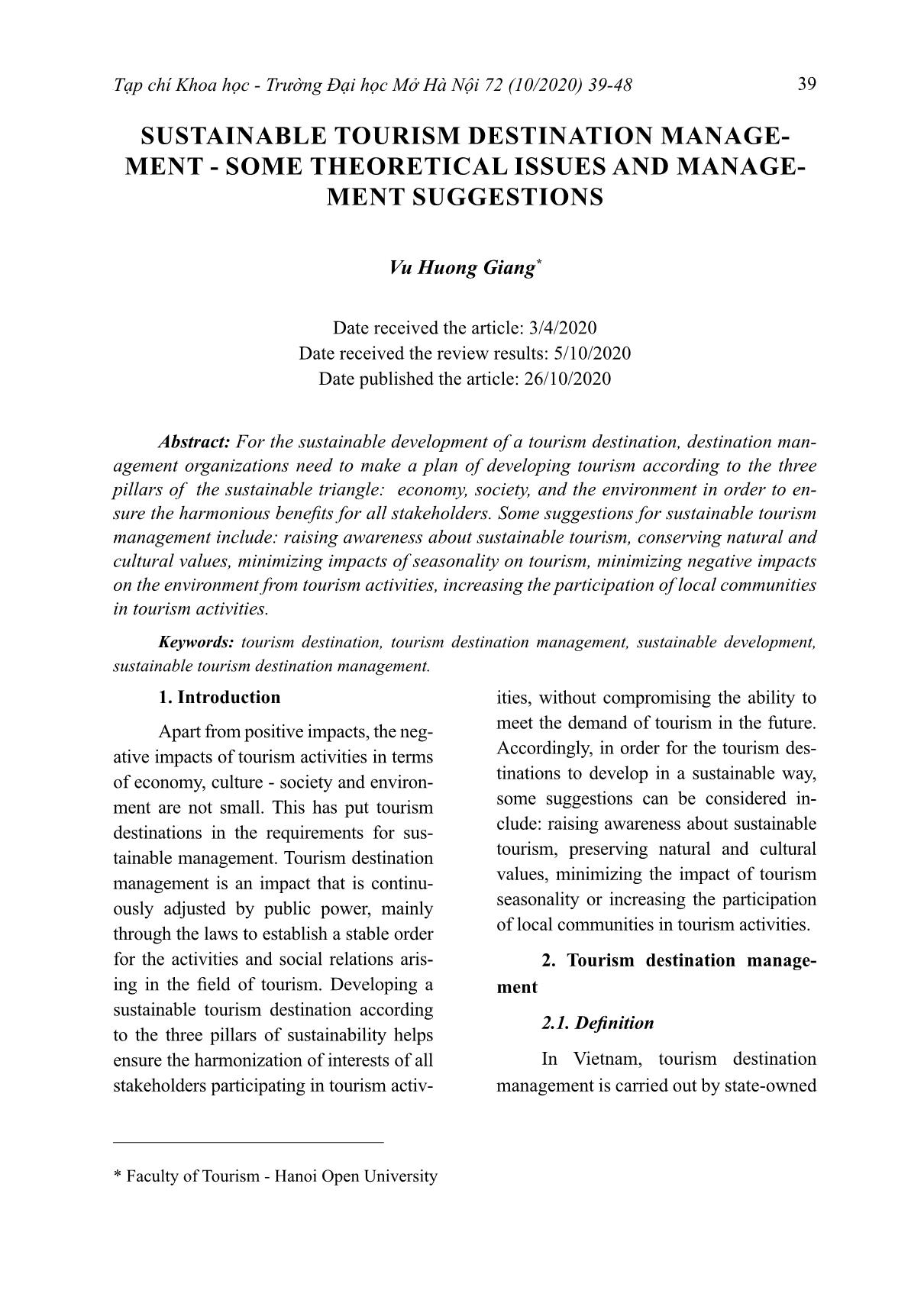
Trang 1
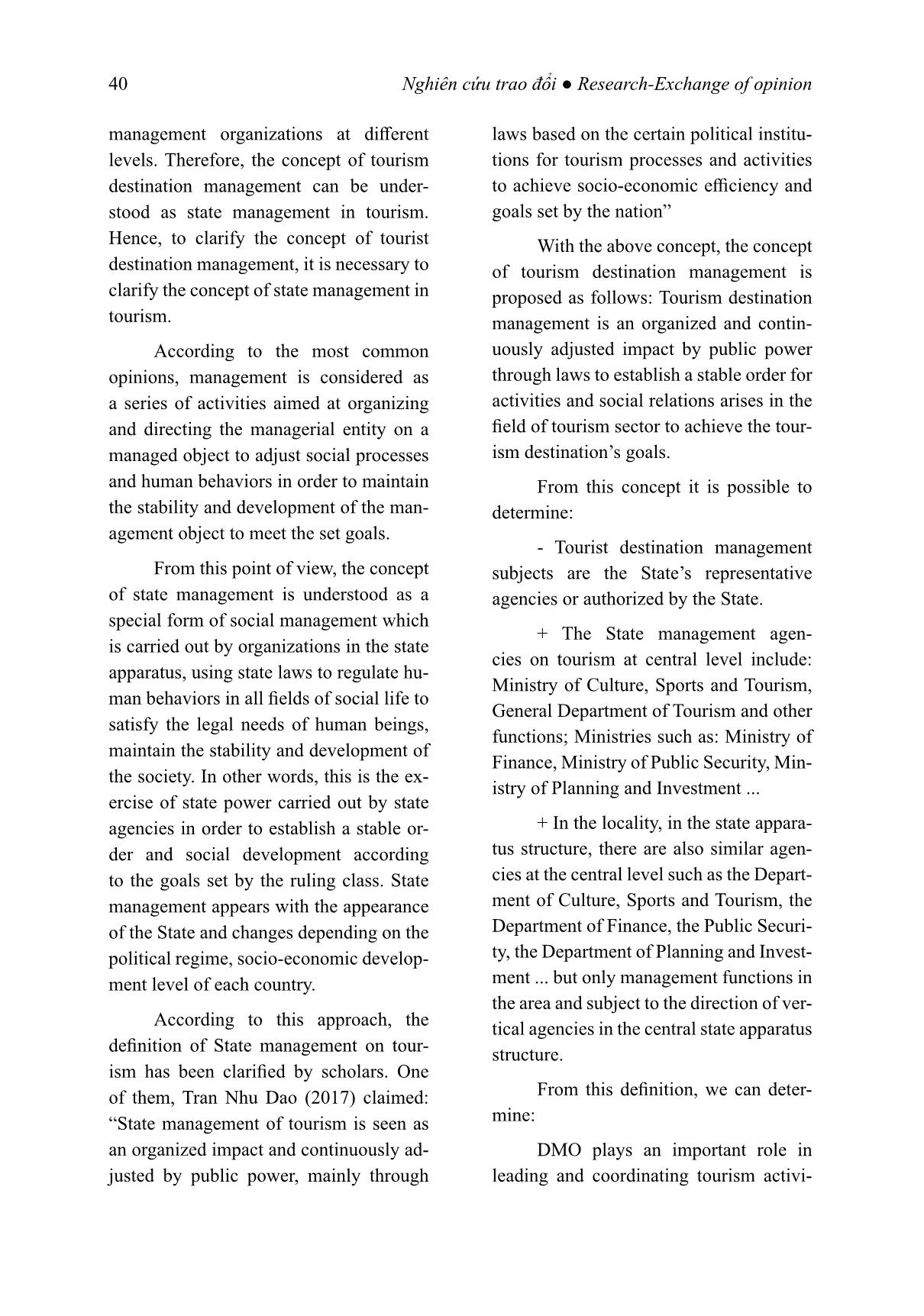
Trang 2
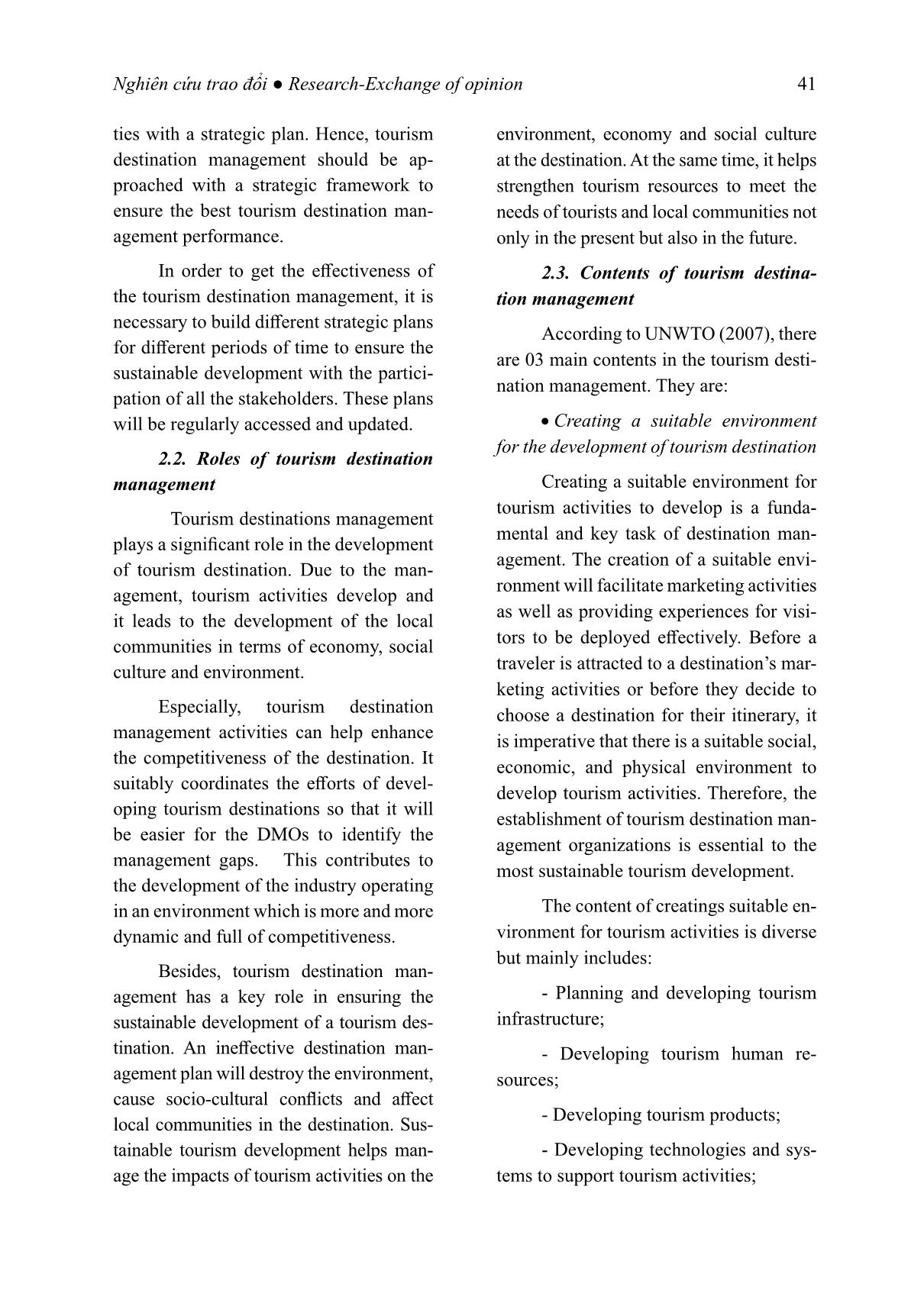
Trang 3
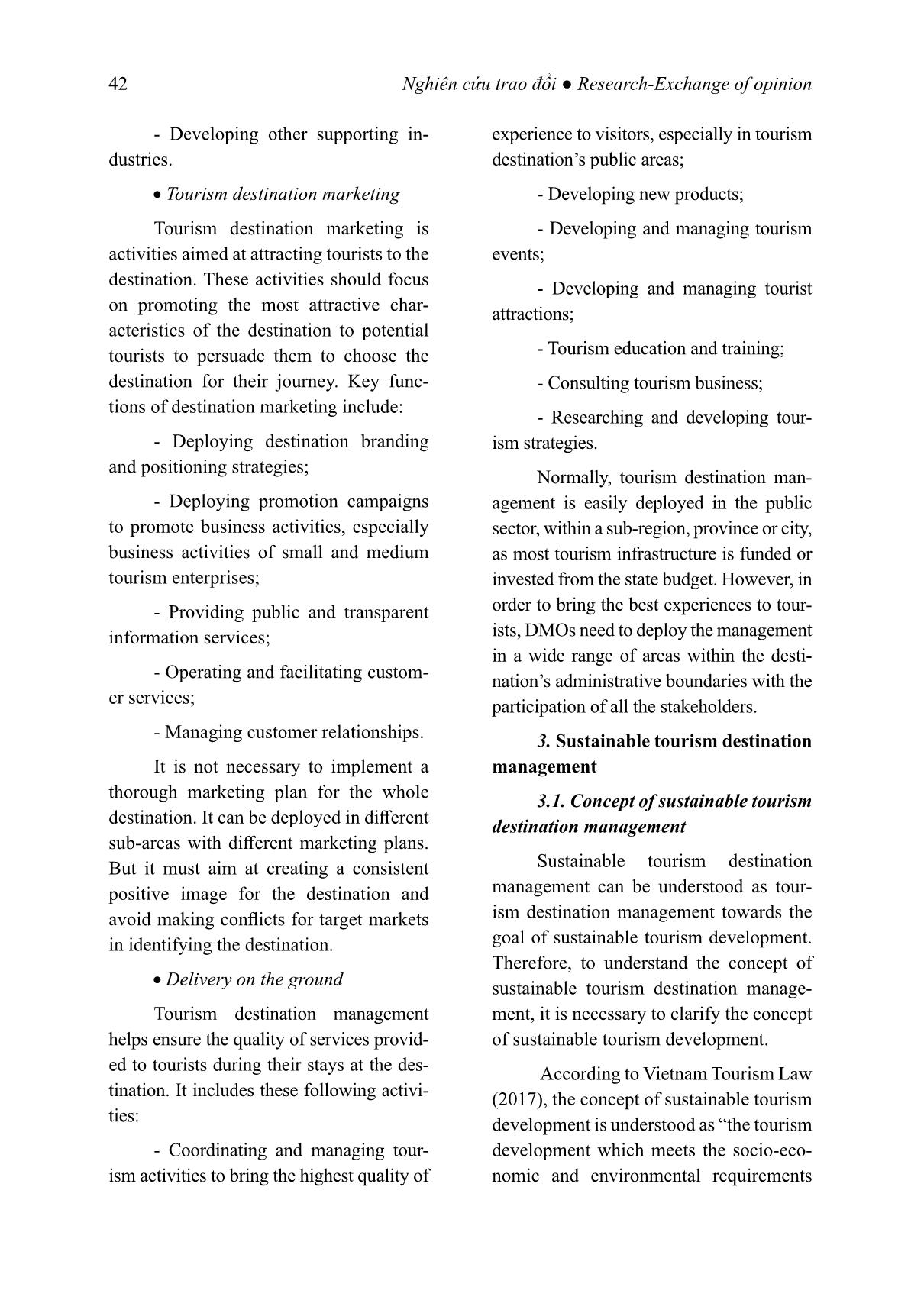
Trang 4
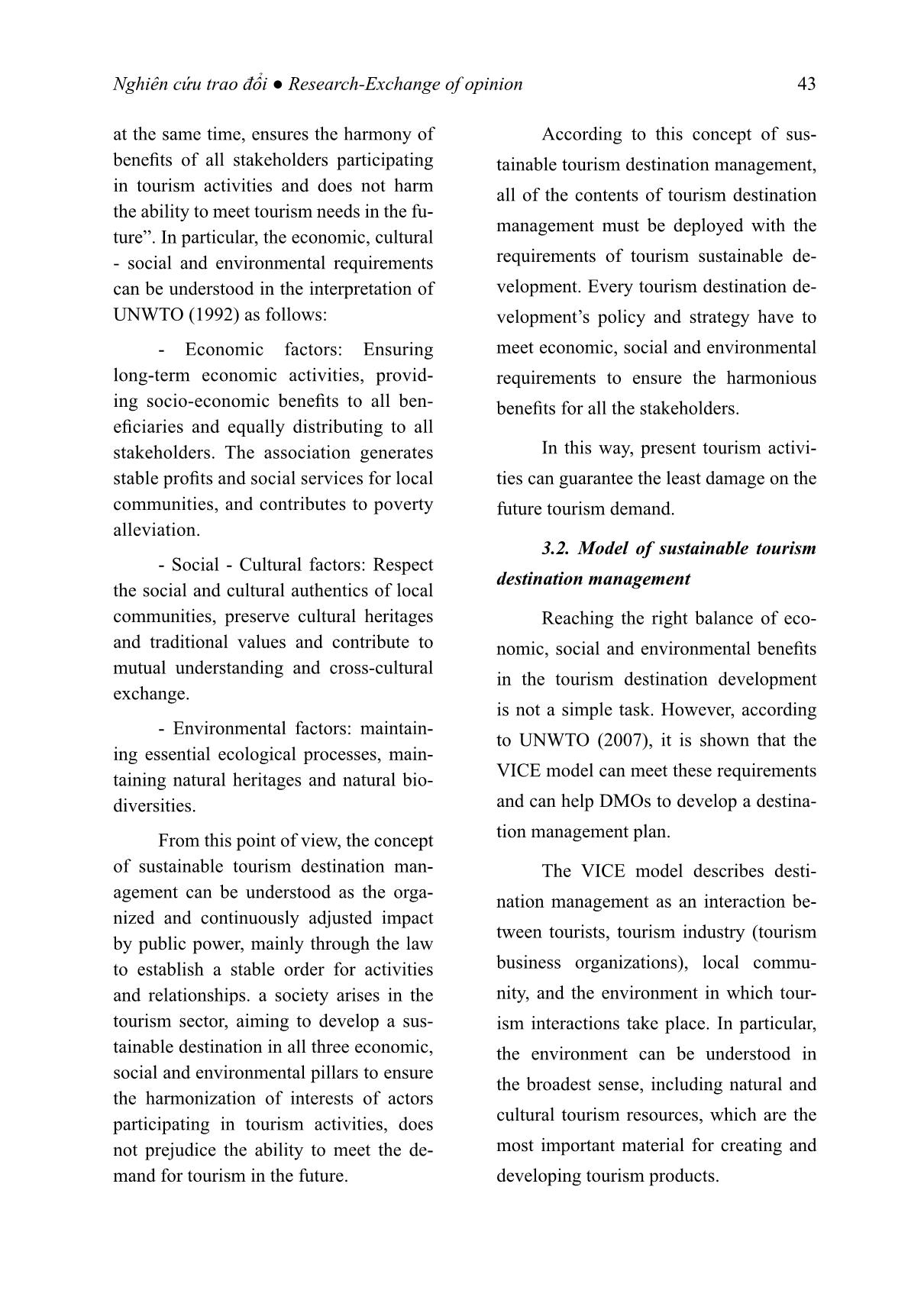
Trang 5
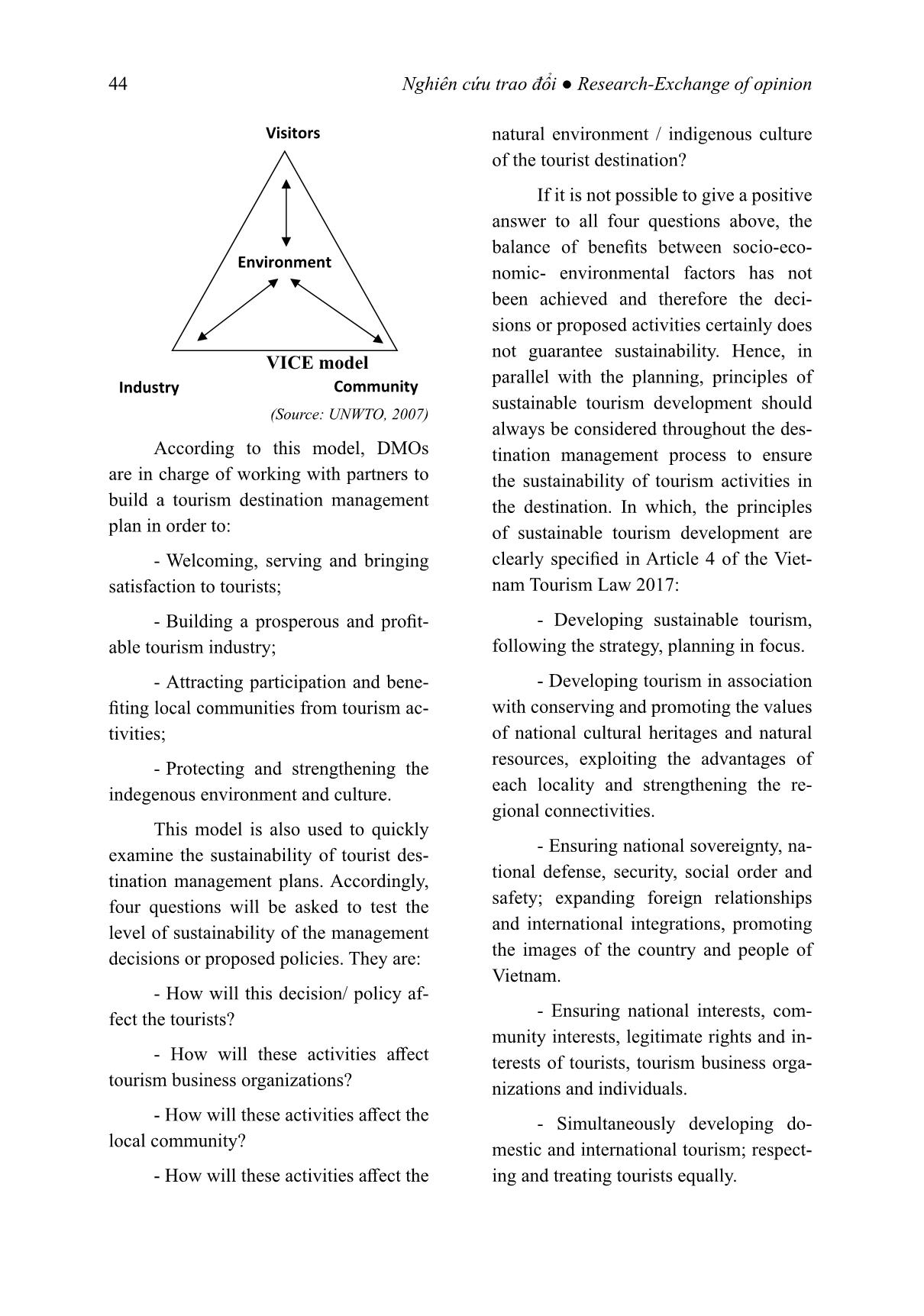
Trang 6
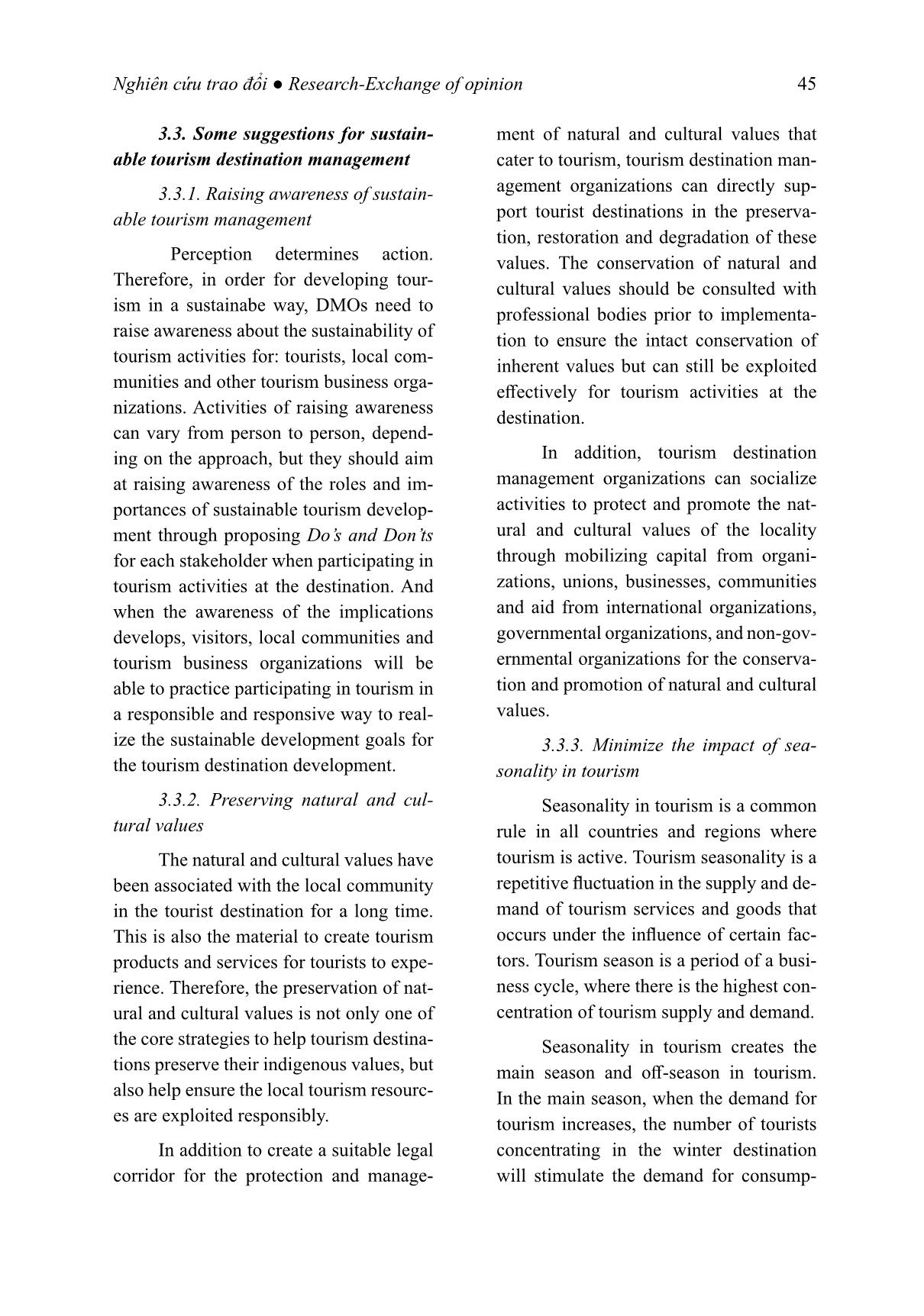
Trang 7
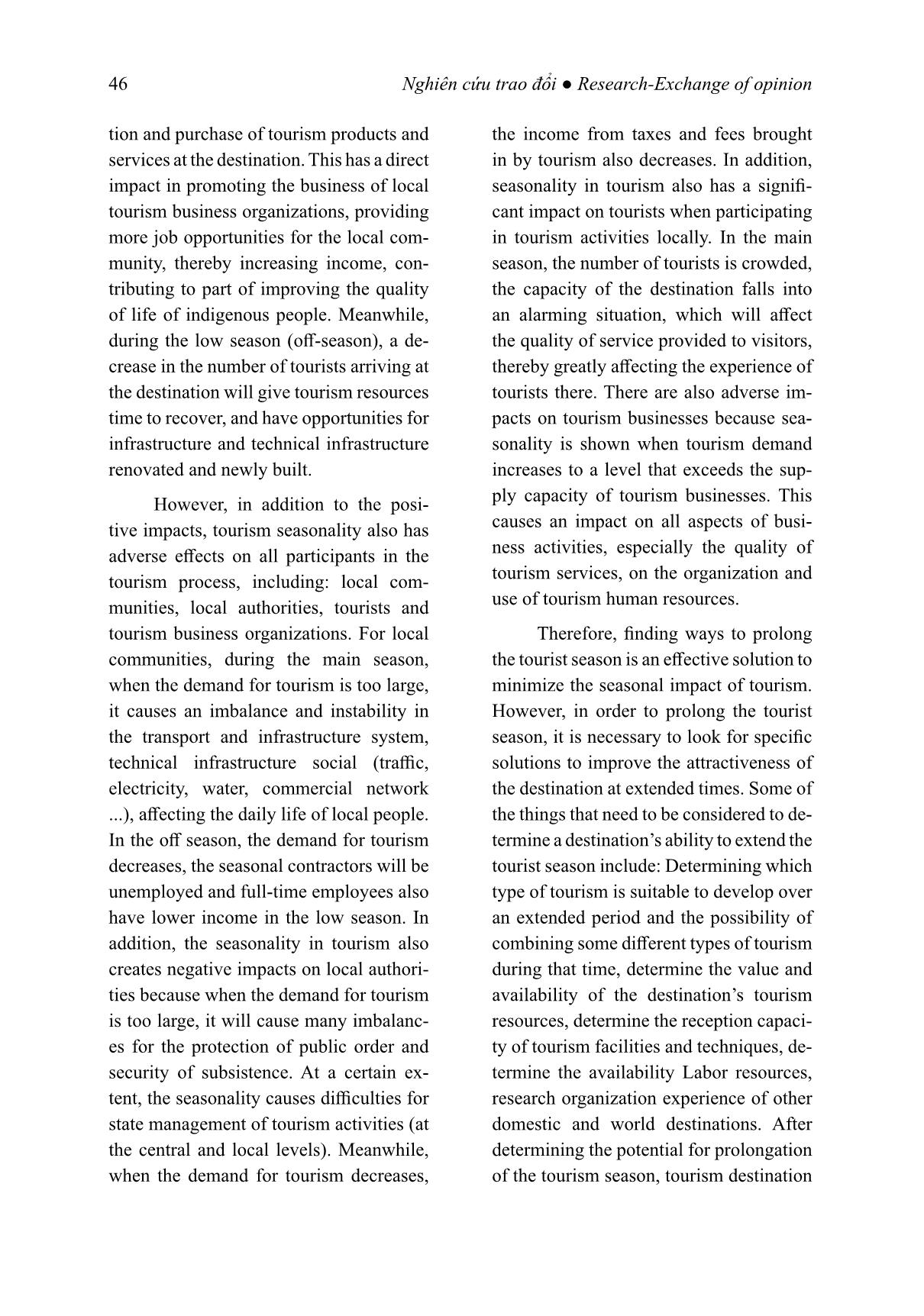
Trang 8
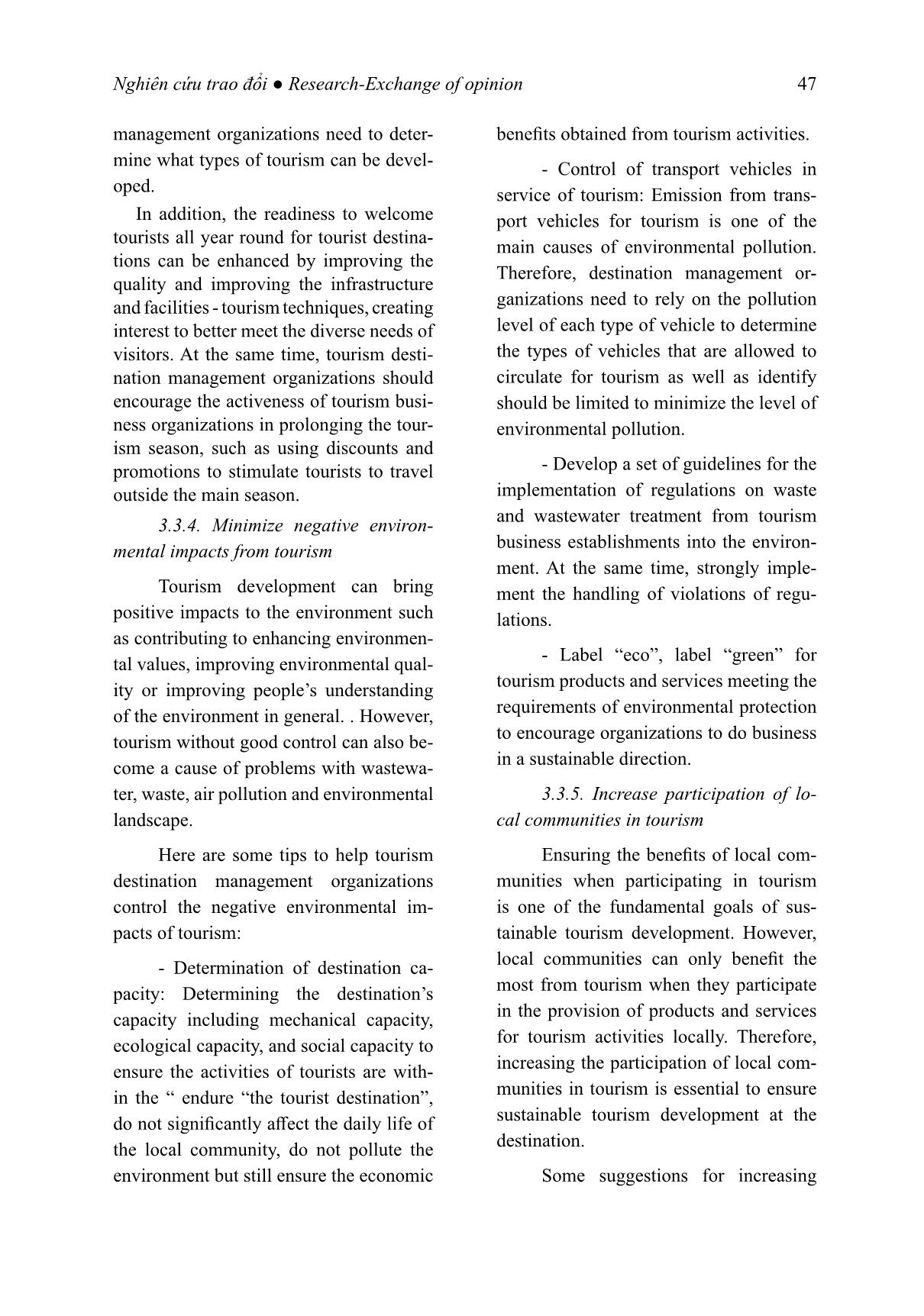
Trang 9
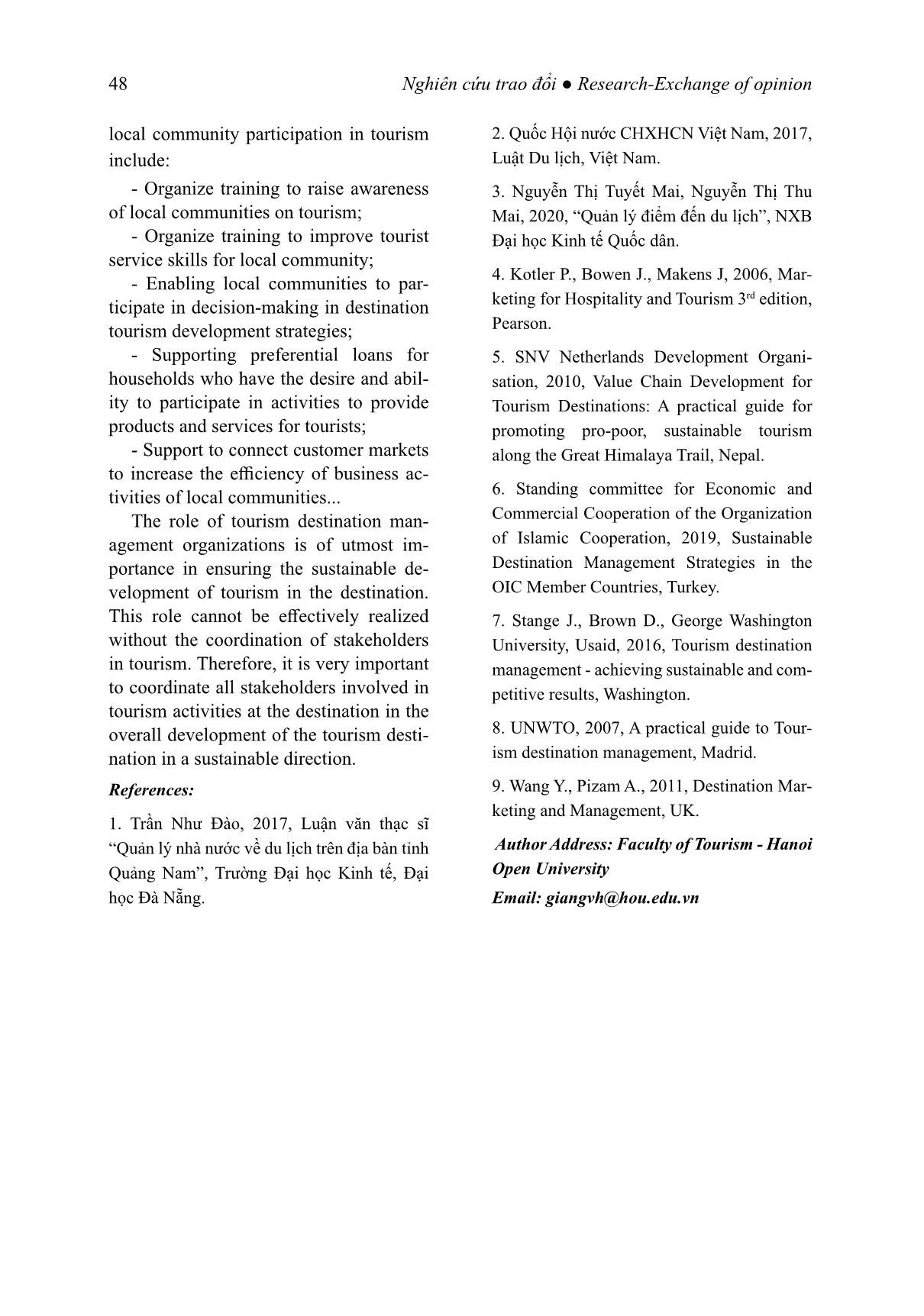
Trang 10
Bạn đang xem tài liệu "Sustainable tourism destination management - Some theoretical issues and management suggestions", để tải tài liệu gốc về máy hãy click vào nút Download ở trên
Tóm tắt nội dung tài liệu: Sustainable tourism destination management - Some theoretical issues and management suggestions
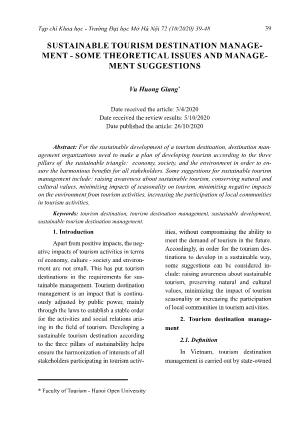
UNWTO, 2007) According to this model, DMOs are in charge of working with partners to build a tourism destination management plan in order to: - Welcoming, serving and bringing satisfaction to tourists; - Building a prosperous and profi t- able tourism industry; - Attracting participation and bene- fi ting local communities from tourism ac- tivities; - Protecting and strengthening the indegenous environment and culture. This model is also used to quickly examine the sustainability of tourist des- tination management plans. Accordingly, four questions will be asked to test the level of sustainability of the management decisions or proposed policies. They are: - How will this decision/ policy af- fect the tourists? - How will these activities aff ect tourism business organizations? - How will these activities aff ect the local community? - How will these activities aff ect the natural environment / indigenous culture of the tourist destination? If it is not possible to give a positive answer to all four questions above, the balance of benefi ts between socio-eco- nomic- environmental factors has not been achieved and therefore the deci- sions or proposed activities certainly does not guarantee sustainability. Hence, in parallel with the planning, principles of sustainable tourism development should always be considered throughout the des- tination management process to ensure the sustainability of tourism activities in the destination. In which, the principles of sustainable tourism development are clearly specifi ed in Article 4 of the Viet- nam Tourism Law 2017: - Developing sustainable tourism, following the strategy, planning in focus. - Developing tourism in association with conserving and promoting the values of national cultural heritages and natural resources, exploiting the advantages of each locality and strengthening the re- gional connectivities. - Ensuring national sovereignty, na- tional defense, security, social order and safety; expanding foreign relationships and international integrations, promoting the images of the country and people of Vietnam. - Ensuring national interests, com- munity interests, legitimate rights and in- terests of tourists, tourism business orga- nizations and individuals. - Simultaneously developing do- mestic and international tourism; respect- ing and treating tourists equally. 45Nghiên cứu trao đổi ● Research-Exchange of opinion 3.3. Some suggestions for sustain- able tourism destination management 3.3.1. Raising awareness of sustain- able tourism management Perception determines action. Therefore, in order for developing tour- ism in a sustainabe way, DMOs need to raise awareness about the sustainability of tourism activities for: tourists, local com- munities and other tourism business orga- nizations. Activities of raising awareness can vary from person to person, depend- ing on the approach, but they should aim at raising awareness of the roles and im- portances of sustainable tourism develop- ment through proposing Do’s and Don’ts for each stakeholder when participating in tourism activities at the destination. And when the awareness of the implications develops, visitors, local communities and tourism business organizations will be able to practice participating in tourism in a responsible and responsive way to real- ize the sustainable development goals for the tourism destination development. 3.3.2. Preserving natural and cul- tural values The natural and cultural values have been associated with the local community in the tourist destination for a long time. This is also the material to create tourism products and services for tourists to expe- rience. Therefore, the preservation of nat- ural and cultural values is not only one of the core strategies to help tourism destina- tions preserve their indigenous values, but also help ensure the local tourism resourc- es are exploited responsibly. In addition to create a suitable legal corridor for the protection and manage- ment of natural and cultural values that cater to tourism, tourism destination man- agement organizations can directly sup- port tourist destinations in the preserva- tion, restoration and degradation of these values. The conservation of natural and cultural values should be consulted with professional bodies prior to implementa- tion to ensure the intact conservation of inherent values but can still be exploited eff ectively for tourism activities at the destination. In addition, tourism destination management organizations can socialize activities to protect and promote the nat- ural and cultural values of the locality through mobilizing capital from organi- zations, unions, businesses, communities and aid from international organizations, governmental organizations, and non-gov- ernmental organizations for the conserva- tion and promotion of natural and cultural values. 3.3.3. Minimize the impact of sea- sonality in tourism Seasonality in tourism is a common rule in all countries and regions where tourism is active. Tourism seasonality is a repetitive fl uctuation in the supply and de- mand of tourism services and goods that occurs under the infl uence of certain fac- tors. Tourism season is a period of a busi- ness cycle, where there is the highest con- centration of tourism supply and demand. Seasonality in tourism creates the main season and off -season in tourism. In the main season, when the demand for tourism increases, the number of tourists concentrating in the winter destination will stimulate the demand for consump- 46 Nghiên cứu trao đổi ● Research-Exchange of opinion tion and purchase of tourism products and services at the destination. This has a direct impact in promoting the business of local tourism business organizations, providing more job opportunities for the local com- munity, thereby increasing income, con- tributing to part of improving the quality of life of indigenous people. Meanwhile, during the low season (off -season), a de- crease in the number of tourists arriving at the destination will give tourism resources time to recover, and have opportunities for infrastructure and technical infrastructure renovated and newly built. However, in addition to the posi- tive impacts, tourism seasonality also has adverse eff ects on all participants in the tourism process, including: local com- munities, local authorities, tourists and tourism business organizations. For local communities, during the main season, when the demand for tourism is too large, it causes an imbalance and instability in the transport and infrastructure system, technical infrastructure social (traffi c, electricity, water, commercial network ...), aff ecting the daily life of local people. In the off season, the demand for tourism decreases, the seasonal contractors will be unemployed and full-time employees also have lower income in the low season. In addition, the seasonality in tourism also creates negative impacts on local authori- ties because when the demand for tourism is too large, it will cause many imbalanc- es for the protection of public order and security of subsistence. At a certain ex- tent, the seasonality causes diffi culties for state management of tourism activities (at the central and local levels). Meanwhile, when the demand for tourism decreases, the income from taxes and fees brought in by tourism also decreases. In addition, seasonality in tourism also has a signifi - cant impact on tourists when participating in tourism activities locally. In the main season, the number of tourists is crowded, the capacity of the destination falls into an alarming situation, which will aff ect the quality of service provided to visitors, thereby greatly aff ecting the experience of tourists there. There are also adverse im- pacts on tourism businesses because sea- sonality is shown when tourism demand increases to a level that exceeds the sup- ply capacity of tourism businesses. This causes an impact on all aspects of busi- ness activities, especially the quality of tourism services, on the organization and use of tourism human resources. Therefore, fi nding ways to prolong the tourist season is an eff ective solution to minimize the seasonal impact of tourism. However, in order to prolong the tourist season, it is necessary to look for specifi c solutions to improve the attractiveness of the destination at extended times. Some of the things that need to be considered to de- termine a destination’s ability to extend the tourist season include: Determining which type of tourism is suitable to develop over an extended period and the possibility of combining some diff erent types of tourism during that time, determine the value and availability of the destination’s tourism resources, determine the reception capaci- ty of tourism facilities and techniques, de- termine the availability Labor resources, research organization experience of other domestic and world destinations. After determining the potential for prolongation of the tourism season, tourism destination 47Nghiên cứu trao đổi ● Research-Exchange of opinion management organizations need to deter- mine what types of tourism can be devel- oped. In addition, the readiness to welcome tourists all year round for tourist destina- tions can be enhanced by improving the quality and improving the infrastructure and facilities - tourism techniques, creating interest to better meet the diverse needs of visitors. At the same time, tourism desti- nation management organizations should encourage the activeness of tourism busi- ness organizations in prolonging the tour- ism season, such as using discounts and promotions to stimulate tourists to travel outside the main season. 3.3.4. Minimize negative environ- mental impacts from tourism Tourism development can bring positive impacts to the environment such as contributing to enhancing environmen- tal values, improving environmental qual- ity or improving people’s understanding of the environment in general. . However, tourism without good control can also be- come a cause of problems with wastewa- ter, waste, air pollution and environmental landscape. Here are some tips to help tourism destination management organizations control the negative environmental im- pacts of tourism: - Determination of destination ca- pacity: Determining the destination’s capacity including mechanical capacity, ecological capacity, and social capacity to ensure the activities of tourists are with- in the “ endure “the tourist destination”, do not signifi cantly aff ect the daily life of the local community, do not pollute the environment but still ensure the economic benefi ts obtained from tourism activities. - Control of transport vehicles in service of tourism: Emission from trans- port vehicles for tourism is one of the main causes of environmental pollution. Therefore, destination management or- ganizations need to rely on the pollution level of each type of vehicle to determine the types of vehicles that are allowed to circulate for tourism as well as identify should be limited to minimize the level of environmental pollution. - Develop a set of guidelines for the implementation of regulations on waste and wastewater treatment from tourism business establishments into the environ- ment. At the same time, strongly imple- ment the handling of violations of regu- lations. - Label “eco”, label “green” for tourism products and services meeting the requirements of environmental protection to encourage organizations to do business in a sustainable direction. 3.3.5. Increase participation of lo- cal communities in tourism Ensuring the benefi ts of local com- munities when participating in tourism is one of the fundamental goals of sus- tainable tourism development. However, local communities can only benefi t the most from tourism when they participate in the provision of products and services for tourism activities locally. Therefore, increasing the participation of local com- munities in tourism is essential to ensure sustainable tourism development at the destination. Some suggestions for increasing 48 Nghiên cứu trao đổi ● Research-Exchange of opinion local community participation in tourism include: - Organize training to raise awareness of local communities on tourism; - Organize training to improve tourist service skills for local community; - Enabling local communities to par- ticipate in decision-making in destination tourism development strategies; - Supporting preferential loans for households who have the desire and abil- ity to participate in activities to provide products and services for tourists; - Support to connect customer markets to increase the effi ciency of business ac- tivities of local communities... The role of tourism destination man- agement organizations is of utmost im- portance in ensuring the sustainable de- velopment of tourism in the destination. This role cannot be eff ectively realized without the coordination of stakeholders in tourism. Therefore, it is very important to coordinate all stakeholders involved in tourism activities at the destination in the overall development of the tourism desti- nation in a sustainable direction. References: 1. Trần Như Đào, 2017, Luận văn thạc sĩ “Quản lý nhà nước về du lịch trên địa bàn tỉnh Quảng Nam”, Trường Đại học Kinh tế, Đại học Đà Nẵng. 2. Quốc Hội nước CHXHCN Việt Nam, 2017, Luật Du lịch, Việt Nam. 3. Nguyễn Thị Tuyết Mai, Nguyễn Thị Thu Mai, 2020, “Quản lý điểm đến du lịch”, NXB Đại học Kinh tế Quốc dân. 4. Kotler P., Bowen J., Makens J, 2006, Mar- keting for Hospitality and Tourism 3rd edition, Pearson. 5. SNV Netherlands Development Organi- sation, 2010, Value Chain Development for Tourism Destinations: A practical guide for promoting pro-poor, sustainable tourism along the Great Himalaya Trail, Nepal. 6. Standing committee for Economic and Commercial Cooperation of the Organization of Islamic Cooperation, 2019, Sustainable Destination Management Strategies in the OIC Member Countries, Turkey. 7. Stange J., Brown D., George Washington University, Usaid, 2016, Tourism destination management - achieving sustainable and com- petitive results, Washington. 8. UNWTO, 2007, A practical guide to Tour- ism destination management, Madrid. 9. Wang Y., Pizam A., 2011, Destination Mar- keting and Management, UK. Author Address: Faculty of Tourism - Hanoi Open University Email: giangvh@hou.edu.vn
File đính kèm:
 sustainable_tourism_destination_management_some_theoretical.pdf
sustainable_tourism_destination_management_some_theoretical.pdf

